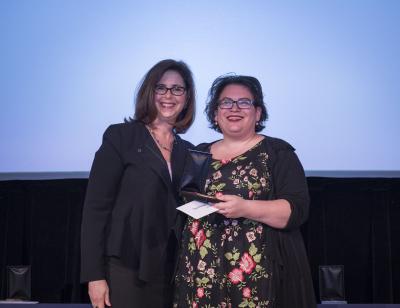Hammer Receives 2018 Teaching Innovation Award

Jessica Hammer, assistant professor at Carnegie Mellon University, jointly appointed in the Human-Computer Interaction Institute (HCII) and the Entertainment Technology Center (ETC), has received the 2018 award for Teaching Innovation. All university award winners were recognized at the Celebration of Education awards ceremony and reception on Monday, April 30, 2018.
The CMU Celebration of Education recognizes Carnegie Mellon's distinguished faculty members and educators for their outstanding contributions to the university and their devotion to and effectiveness in teaching.
Hammer was nominated by both colleagues and students with praises for her innovative approaches to teaching.
For example, while teaching the course "Game Design for Crowd and Cloud," originally co-developed with Associate Professor Jeffrey Bigham, Hammer improved the feedback process to help students offer more thoughtful feedback about games-in-progress to their peers.
Due to the nature of game design, feedback from players is of utmost importance to the game design process. Unstructured peer feedback sessions exhibited a range of problems, such as advice-heavy feedback that didn’t provide useful data for decision-making. Implementing EOTA, a more structured process, helped students to both deliver and receive better, more constructive feedback on game designs.
EOTA, an acronym for Experience, Observe, Theorize, Advise, divides the feedback process into four phases. Within each phase, students provide a range of perspectives, increasing the diversity of feedback provided. Providing low-level data (experiences and observations) before allowing students to theorize or advise makes it easier for students to deliver critical feedback, and gives design teams more versatility in incorporating feedback into their design process.
“EOTA has incredible potential to improve teaching practice in other disciplines,” Bigham wrote in his nominating letter. “Increasingly, students want to work across disciplines, and work on real projects that others need to experience in order to give useful feedback. The EOTA methodology could be adopted readily by any course in which students create artifacts that can be experienced, and in which some of the pedagogical goals of the course include the ability to give and incorporate thoughtful feedback.”
Not only does the EOTA process provide better feedback, but Hammer has seen that it engages more students than traditional, unstructured feedback sessions.
In a supporting letter, Associate Teaching Professor Karen Kornblum Berntsen, commended Hammer’s ability to create a positive learning environment. Berntsen co-taught an Interaction Design Studio with Hammer in 2016.
“In her interactions with students, Jessica consistently took control of the subject matter (interaction design), while creating an atmosphere where students felt comfortable and engaged,” Berntsen wrote.
Making students feel comfortable and confident to take creative risks is another important part of Hammer’s pedagogy. “Since introducing short-form, low-stakes, deliberately imperfect design activities into my classes, I have observed my students become more willing to take risks, not only with their ideas but also with their personal choices. For example, students are more willing to take on new roles within their project group, such as volunteering to be the team’s developer when they have limited prior experience.”
Inspired by the work of colleague Brenda Bakker Harger, associate teaching professor at the ETC, Hammer begins each game design class with a short improvisation activity. Acting out various improv prompts like “Yes, and”, “Yes, but” and partner mirroring helps the students become more comfortable with the vulnerability of working in interdisciplinary teams and presenting imperfect work in front of a group.
After all, many of the key principles of improv – listening, making swift choices, and building on your partner’s contributions – are the same skills needed for leading successful group-based iterative design, including hearing feedback clearly and developing a storyline.
MHCI student Po Bhattacharyya wrote in another supporting nomination letter that Hammer’s use of improv activities in class “made us more creative and playful as game designers; it introduced students to the ‘yes, and’ philosophy, in which participants always add to the conversation and never put their teammates down. Jessica’s choice of improv in a technology class was a brilliant way of emphasizing a number of soft skills that people in my field sometimes lack.”
Hammer combines game design with qualitative and quantitative research techniques to understand how games impact human behavior. Hammer is an award-winning game designer, most recently with Rosenstrasse receiving an Official Selection at IndieCade 2017 and Outbreak receiving Meaningful Play Player’s Choice in 2016.
Her work has been supported by the Heinz Foundation, the Okawa Foundation, Google, Amazon and Verizon.

